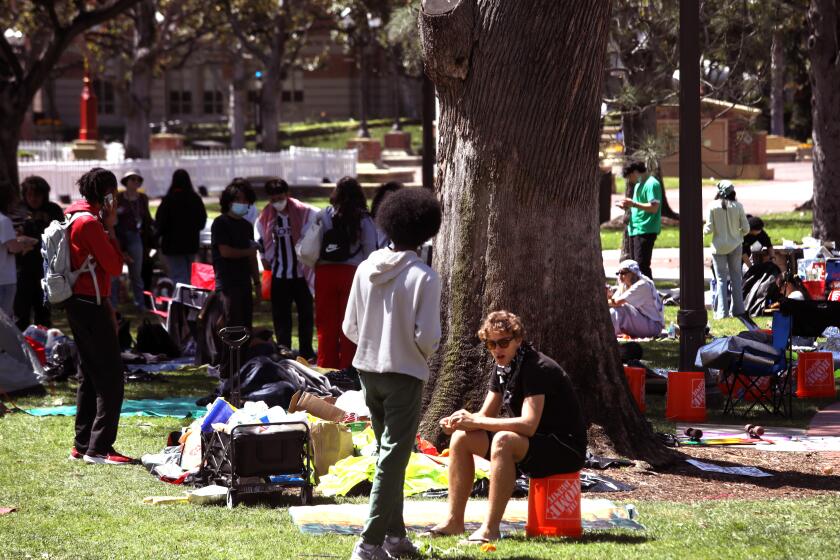Educators take learning to a new degree
Brad Davidson is pleased to be a pioneer -- even if it means giving up his Saturdays and one night a week.
An assistant principal at Bancroft Middle School in Long Beach, he is among the first 148 students statewide to enroll in new doctoral degree programs in education at Cal State University campuses. The classes mark a historic change for the Cal State system, which in the past had been forbidden from offering any degrees on its own higher than a master’s.
“For me, this is really a knowledge journey,” explained Davidson, 36, a former U.S. history teacher who recently started his three years of doctoral classes at Cal State Long Beach in hopes of becoming a principal. “The degree is not necessary to be an educational leader, but it certainly will make me a much better leader.”
For decades, the Cal State University system lusted after something its sister institution, the University of California, had: the ability to award doctorate degrees independently.
That changed two years ago when legislation, written by state Sen. Jack Scott (D-Altadena), modified state law and allowed Cal State to offer doctoral programs to train future generations of administrators in K-12 schools and community colleges.
On Thursday, Scott and Cal State system Chancellor Charles B. Reed participated in a conference call from Sacramento to announce that the educational doctorate programs were starting this fall, or had already began this summer, at seven of the 23 Cal State campuses: Fresno, Fullerton, Long Beach, Sacramento, San Bernardino, San Diego and San Francisco.
Four more campuses will offer the programs next year -- Bakersfield, East Bay, Northridge and Stanislaus -- and others are expected to follow in the future.
Reed, speaking in a conference call with reporters, called the start-ups an important move that would “provide a national model for the reform of educational leadership.”
The curriculum includes theory, research and practical experience, and the classes will be held mainly at night and on weekends to cater to people like Davidson who hold down jobs, officials said.
Annual student fees are set at $11,844 and are to rise to $13,563 over the next two years, costs that Scott said are very much below tuition at private institutions.
Scott, a former president of Pasadena City College and of Cypress College, said his legislation was designed to help California catch up to other states in providing advanced education for school and college administrators. “This is going to turn out leaders who will make a difference,” he said.
UC originally opposed any changes to the master plan that would take away its doctorate monopoly among California’s public universities.
But Scott’s bill won approval by limiting Cal State doctorates to the field of education and requiring a review of the programs’ effectiveness in five years, among other things.
Six UC campuses have offered joint-education doctorates with Cal State campuses, and those programs enroll about 75 new students a year statewide. Reed said he expected all of the joint classes to be phased out, although UC officials indicated that a few would continue for the time being
UC’s education schools still would offer their own doctorates, officials said.
More than 350 people applied to the new Cal State programs, half were admitted and 148 enrolled, officials said. About 60% of them are women, and nearly half are ethnic minorities.
The new classes at Long Beach began this summer with more than two dozen students, participants said. Among them is Allison Deegan, a business advisory services manager at the Los Angeles County Office of Education in Downey. Deegan, 47, said she had considered other doctoral programs, including ones with daytime, mid-week classes that would have forced her to quit her job. Then she learned of the Cal State classes, which usually last three hours on one weeknight and more than eight hours on Saturdays.
“The time commitment is quite daunting, but I have to say I feel so lucky to be in this class,” said Deegan, whose courses have included organizational leadership and a history of American education. Her classmates’ diverse backgrounds and experiences make discussions stimulating, she said, explaining: “We feel we are going to solve problems.”
For many students, a doctorate can mean a bump in salary. But Davidson insisted that was not the main reason he enrolled. He said it was special to be among the pioneers.
“I’m honored to be part of the first,” he said. “I feel this is something unique.”
--
(BEGIN TEXT OF INFOBOX)
Back story
In 1960, the state created its master plan for higher education, which spelled out the different missions of three levels of colleges. The University of California was defined as the state’s main academic research institution, with sole authority to award doctorates.
State colleges, later renamed the California State University system, would offer bachelor’s and master’s degrees and have primary responsibility for teacher education and credentialing. The community colleges would offer two-year degrees, along with vocational and adult education.
The master plan continues to guide higher education in California. A 2005 law allows an exception to the master plan to permit Cal State schools to offer doctorates in education.
Source: Times reporting
More to Read
Start your day right
Sign up for Essential California for news, features and recommendations from the L.A. Times and beyond in your inbox six days a week.
You may occasionally receive promotional content from the Los Angeles Times.







